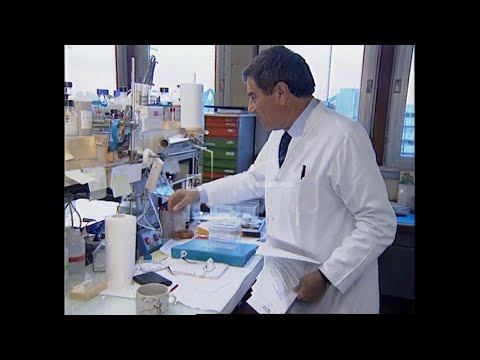(31 May 2025)
RESTRICTION SUMMARY:
ASSOCIATED PRESS
ARCHIVE: Paris, France – 11 January 1995
++4:3++
1. Various of French scientist Étienne-Émile Baulieu at work
2. SOUNDBITE (English) Étienne-Émile Baulieu, French scientist, talking about DHEA hormone research:
"Since it has been observed that giving DHEA (Dehydroepiandrosterone) to other normal ageing people, many times their joint pains – aches – were erased. We thought it value (valuable) to test that systematically, and naturally this is in a department of rheumatology, that is easier because people are well-classified and tested."
3. Various of Baulieu at work
4. Various of pills
STORYLINE:
French scientist Étienne-Émile Baulieu, known as the inventor of the abortion pill, died on Friday aged 98 at his home in Paris.
Both a practicing doctor and a researcher, Baulieu was known around the world for the scientific, medical and social significance of his work on the role of steroid hormones.
In 1982, he developed RU 486, the so-called “abortion pill” that changed the lives of millions of women, offering them the possibility of voluntary medical termination of pregnancy, in physical and psychological safety.
The institute that bears his name said his research was guided by his attachment to the progress made possible by science and his commitment to women’s freedom.
Born Étienne Blum in Strasbourg on Dec. 12, 1926, he took the name “Émile Baulieu” when he joined the French Resistance against the Nazi occupation at the age of 15.
An endocrinologist with a doctorate in medicine completed in 1955 and one in science eight years later, in 1963 Baulieu founded a pioneering research unit working on hormones at INSERM, the French institute for health and medical research.
He remained as head of the unit until 1997.
Baulieu is best known for his development, in 1982, of RU 486, the so-called “abortion pill”.
The Institut Baulieu said it was “a non-invasive method, less aggressive and less delayed than surgery,” noting that following his discovery the researcher faced fierce criticism and even threats from opponents of women’s abortion rights.
“Even today, access to this method is opposed, banned in some countries, and is currently being challenged in the United States, where it is the most widely used abortion method,” the institute added.
Baulieu’s research into DHEA, a hormone whose secretion and anti-aging activity he had discovered, led him to work on neurosteroids — or steroids of the nervous system.
He also developed an original treatment to combat depression, for which a clinical trial is currently underway in several university hospitals.
In 2008, he founded the Institut Baulieu to understand, prevent and treat neurodegenerative diseases such as Alzheimer’s.
Honored with the grand crosses of the Légion d’Honneur (legion of honor) and the Ordre National du Mérite (national order of merit), he was elected to the French Academy of Sciences in 1982, which he chaired in 2003 and 2004.
He was a member of the national advisory committee on life sciences and health (1996-2002) and received numerous awards, both in France and abroad.
French President Emmanuel Macron paid tribute to Baulieu in a post on X, calling him “a beacon of courage” and “a progressive mind who enabled women to win their freedom.”
“Few French people have changed the world to such an extent,” he added.
After the death of his first wife, Yolande Compagnon, he remarried, to Simone Harari Baulieu. He is survived by three children, eight grandchildren and nine great-grandchildren, his institute said.
Find out more about AP Archive: http://www.aparchive.com/HowWeWork
Twitter: https://twitter.com/AP_Archive
Facebook: https://www.facebook.com/APArchives
Instagram: https://www.instagram.com/APNews/
You can license this story through AP Archive: http://www.aparchive.com/metadata/youtube/f0e3e9eb724f4a7cbb14b5521d0913ad
Author: AP Archive
Go to Source
News post in June 5, 2025, 9:04 pm.
Visit Our Sponsor’s:
News Post In – News





